|
Books Should Be Free Loyal Books Free Public Domain Audiobooks & eBook Downloads |
|
|
Books Should Be Free Loyal Books Free Public Domain Audiobooks & eBook Downloads |
|
Top Authors |
|---|
|
Book type:
Sort by:
|
By: Florence Louisa Barclay (1862-1921) | |
|---|---|
 The Rosary
The Rosary
He is a wealthy gifted and handsome young pianist who worships beauty. She is a woman blessed with a divine voice, but a less than beautiful appearance. He proposes, but she cannot believe that his love will last. A tragic accident results in his losing his eyesight. She hears about the accident and takes up employment as his nurse without revealing her identity. This forgotten, 1910 best-seller still holds the power to charm and delight the modern-day reader. One of the most poignant love stories ever written, The Rosary by Florence Louisa Barclay takes its title from the name of a song that was a chart-buster in the early twentieth-century... | |
 The Upas Tree, A Christmas Story for all the Year
The Upas Tree, A Christmas Story for all the Year
Ronald West has a brilliant idea for his next novel, but to do it right, he wants to spend the next six months tramping around central Africa to experience the setting first hand. His wife Helen fully supports his trip, but for the first time in their marriage, she refuses to go along herself. Ronnie is disappointed at her reticence, but plows ahead, planning to be back in England by Christmas. But when Ronnie returns, something is seriously the matter which threatens to make his reunion with Helen, and their Christmas together, anything but merry. (Introduction by MaryAnn) | |
By: Francis Bacon (1561-1626) | |
|---|---|
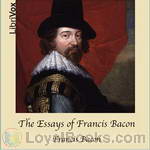 The Essays of Francis Bacon
The Essays of Francis Bacon
Among the many ideas explored in this book are beauty, gardens, honor and reputation, cunning, nobility, friendship and many others. Authored by the man who is credited with having invented the essay form in English, The Essays of Francis Bacon was written over an extended period, ranging from the mid sixteenth century. They were compiled in a single edition in 1597 and later re-written, enlarged and added to in other editions in 1612 and 1625. However, their compelling and insightful quality still appears fresh and appealing to modern day readers... | |
 The New Organon Or True Directions Concerning The Interpretation of Nature
The New Organon Or True Directions Concerning The Interpretation of Nature
The Novum Organum is a philosophical work by Francis Bacon published in 1620. The title translates as “new instrument”. This is a reference to Aristotle’s work Organon, which was his treatise on logic and syllogism. In Novum Organum, Bacon details a new system of logic he believes to be superior to the old ways of syllogism. For Bacon, finding the essence of a thing was a simple process of reduction, and the use of inductive reasoning . . . This work was critical in the historical development of the scientific method. | |
 The New Atlantis
The New Atlantis
In 1623, Francis Bacon expressed his aspirations and ideas in New Atlantis. Released in 1627, this was his creation of an ideal land where people were kind, knowledgeable, and civic-minded. Part of this new land was his perfect college, a vision for our modern research universities. Islands he had visited may have served as models for his ideas. | |
 The Advancement of Learning
The Advancement of Learning
| |
 Valerius Terminus; of the interpretation of nature
Valerius Terminus; of the interpretation of nature
| |
By: Louis Ginzberg (1873-1953) | |
|---|---|
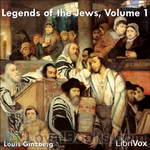 Legends of the Jews
Legends of the Jews
Rabbi Louis Ginzberg was one of the outstanding Talmudists of the twentieth century. He was born on November 28, 1873, in Kovno, Lithuania; he died on November 11, 1953, in New York City. Ginzberg taught at the Jewish Theological seminary from 1903 to 1953. For 50 years, he trained two generations of Conservative Rabbis.The Legends of the Jews is an epic 7-volume compilation of traditional Jewish stories loosely related to the Bible. Volumes 1-4 contain the stories, while volumes 5-7 contain Ginzberg’s notes and commentary... | |
By: Rabindranath Tagore (1861-1941) | |
|---|---|
 The Sadhana: Realisation of Life
The Sadhana: Realisation of Life
Rabindranath Tagore was a Bengali poet, philosopher, visual artist, playwright, composer, and novelist whose work reshaped Bengali literature and music in the late 19th and early 20th centuries. He became Asia’s first Nobel laureate when he won the 1913 Nobel Prize in Literature. Sadhana is a collection of essays, most of which he gave before the Harvard University, describing Indian beliefs, philosophy and culture from different viewpoints, often making comparison with Western thought and culture. | |
 Gitanjali
Gitanjali
Gitanjali is a collection of 103 poems in English, largely translations by the Bengali poet Rabindranath Tagore. This volume became very famous in the West, and was widely translated into other languages. In England a slender volume was published in 1913, with an exhilarating preface by W. B. Yeats. In the same year, Rabindranath became the first non-European to win the Nobel prize. | |
 The Home and the World
The Home and the World
Rabindranath Tagore (1861–1941), also known by the sobriquet Gurudev, was a Bengali poet, Brahmo religionist, visual artist, playwright, novelist, and composer whose works reshaped Bengali literature and music in the late 19th and early 20th centuries. He became Asia’s first Nobel laureate when he won the 1913 Nobel Prize in Literature. The Home and the World is a 1916 novel, set in the estate of the rich Bengali noble Nikhil. He lives happily with his beautiful wife Bimala until the appearance of his friend and radical revolutionist, Sandip... | |
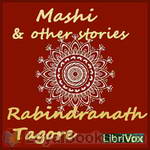 Mashi and Other Stories
Mashi and Other Stories
A collection of short stories written iin English by the Nobel prize winning Bengali writer. | |
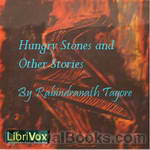 The Hungry Stones and Other Stories
The Hungry Stones and Other Stories
This is a collection of short stories written by the Nobel Laureate Rabindranath Tagore. The stories contained in this volume were translated by several hands. The version of The Victory is the author's own work. The seven stories which follow were translated by Mr. C. F. Andrews, with the help of the author's help. Assistance has also been given by the Rev. E. J. Thompson, Panna Lal Basu, Prabhat Kumar Mukerjii, and the Sister Nivedita. | |
 My Reminiscences
My Reminiscences
These Reminiscences were written and published by the Author in his fiftieth year, shortly before he started on a trip to Europe and America for his failing health in 1912. It was in the course of this trip that he wrote for the first time in the English language for publication. (from preface) | |
 Creative Unity
Creative Unity
Gurudev Rabindranath Tagore talks of the many things he feels is necessary for creativity through joy of unity, he covers many topics like the creative ideal, makes comparisons of creativity between the east and the west, the spirit of freedom and about his idea of an University. | |
 The Post Office
The Post Office
| |
 Stray Birds
Stray Birds
| |
 Chitra, a play in one act
Chitra, a play in one act
| |
 The King of the Dark Chamber
The King of the Dark Chamber
| |
 First Jasmines
First Jasmines
Rabindranath Tagore, was a Bengali polymath who reshaped Bengali literature and music, as well as Indian art with Contextual Modernism in the late 19th and early 20th centuries. Author of Gitanjali and its "profoundly sensitive, fresh and beautiful verse", he became the first non-European to win the Nobel Prize in Literature in 1913. In translation his poetry was viewed as spiritual and mercurial; however, his "elegant prose and magical poetry" remain largely unknown outside Bengal. Tagore introduced new prose and verse forms and the use of colloquial language into Bengali literature, thereby freeing it from traditional models based on classical Sanskrit... | |
 The Fugitive
The Fugitive
| |
 The Spirit of Japan
The Spirit of Japan
| |
 The Cycle of Spring
The Cycle of Spring
| |
By: John Kendrick Bangs (1862-1922) | |
|---|---|
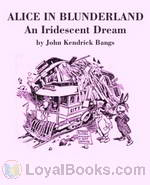 Alice in Blunderland: an Iridescent Dream
Alice in Blunderland: an Iridescent Dream
John Kendrick Bangs (May 27, 1862 – January 21, 1922) was an American author and satirist, and the creator of modern Bangasian Fantasy, the school of fantasy writing that sets the plot wholly or partially in the afterlife. (Wikipedia)Plot summary: J K Bangs has taken Alice from Lewis Carroll’s “Alice in Wonderland” and lets her on a boring day travel with the Mad Hatter, the March Hare, the Cheshire Cat and the other of Carroll’s familiar characters to Blunderland. The story is a well written Satire, a witty, humorous tale of adventure and city politics, a tale of Alice in a land where nothing is as it should be. (Summary by Lars Rolander) | |
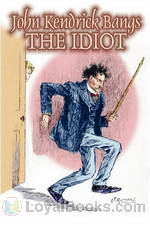 The Idiot
The Idiot
The Idiot is anything but, yet his fellow boarders at Mrs. Smithers-Pedagog’s home for single gentlemen see him as such. His brand of creative thought is dismissed as foolishness yet it continues to get under their skin, because when you’re beneath contempt you can say what you please. – This is the first of John Kendrick Bangs' “Idiot” books and was published by Harper and Brothers in 1895. | |
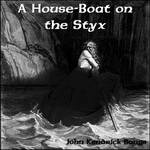 A House-Boat on the Styx
A House-Boat on the Styx
The premise of the book is that everyone who has ever died (up until the time in which the book is set, which seems to be about the time of its publication) has gone to Styx. This does not appear to be the conventional Hell described by Dante in The Inferno, but rather the Hades described in Greek myth (both of which had Styxes): a universal collecting pot for dead souls, regardless of their deeds in life. The book begins with Charon, ferryman of the Styx (in The Inferno, he was the ferryman of the river Acheron) being startled—and annoyed—by the arrival of a house boat on the Styx... | |
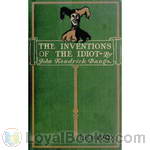 The Inventions of the Idiot
The Inventions of the Idiot
"It was before the Idiot's marriage, and in the days when he was nothing more than a plain boarder in Mrs. Smithers-Pedagog's High-class Home for Single Gentlemen, that he put what the School-master termed his "alleged mind" on plans for the amelioration of the condition of the civilized." This humorous story by the editor of Puck magazine describes how the Idiot sets out to improve the lot of civilized man through his inventions - the lot of barbarian man already being well tended to by missionaries and other do-gooders. | |
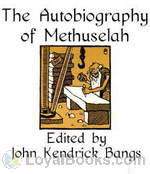 The Autobiography of Methuselah
The Autobiography of Methuselah
A satirical look at early biblical events from the point of view of someone who was there to witness most of them: the oldest man in recorded history. | |
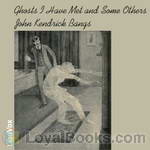 Ghosts I Have Met and Some Others
Ghosts I Have Met and Some Others
New York-born John Kendrick Bangs was associate editor and then editor of Life and Harper magazines, eventually finding his way into the Humour department. Here he began to write his own satire and humour. Ghosts I Have Met and Some Others is a delightfully humourous collection of short tales relating encounters with ghosts. | |
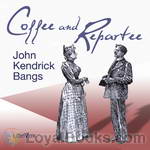 Coffee and Repartee
Coffee and Repartee
First released in 1893, Coffee And Repartee is a collection of breakfast chats at a gentlemans boarding house run by a Mrs. Smithers. Here these fellows repeatedly face questions and proclamations by an inhabitant they call The Idiot. The discussions sound friendly under pretense, but are really sly battles of ribald wit and cunning charm, as well as rather offensive remarks during a time period considered by many to favour a height of refined etiquette. The Idiot spars well, but will the other residents get the better of him? | |
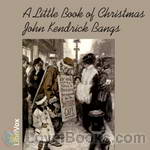 A Little Book Of Christmas
A Little Book Of Christmas
Summary: Four short Christmas stories, a bit sentimental, but still affecting and worthwhile. Plus Four Christmas verses. (Summary by David Wales) | |
 The Pursuit of the House-Boat
The Pursuit of the House-Boat
This sequel to Bangs' A House-Boat on the Styx continues the "thought-experiment" of bringing various historical and fictional figures together, detailing the adventures of the ladies of Hades after they are kidnapped by pirates and the attempts of the Associated Shades (led by Sherlock Holmes) to retrieve their house-boat. (Introduction by Emma Joyce) | |